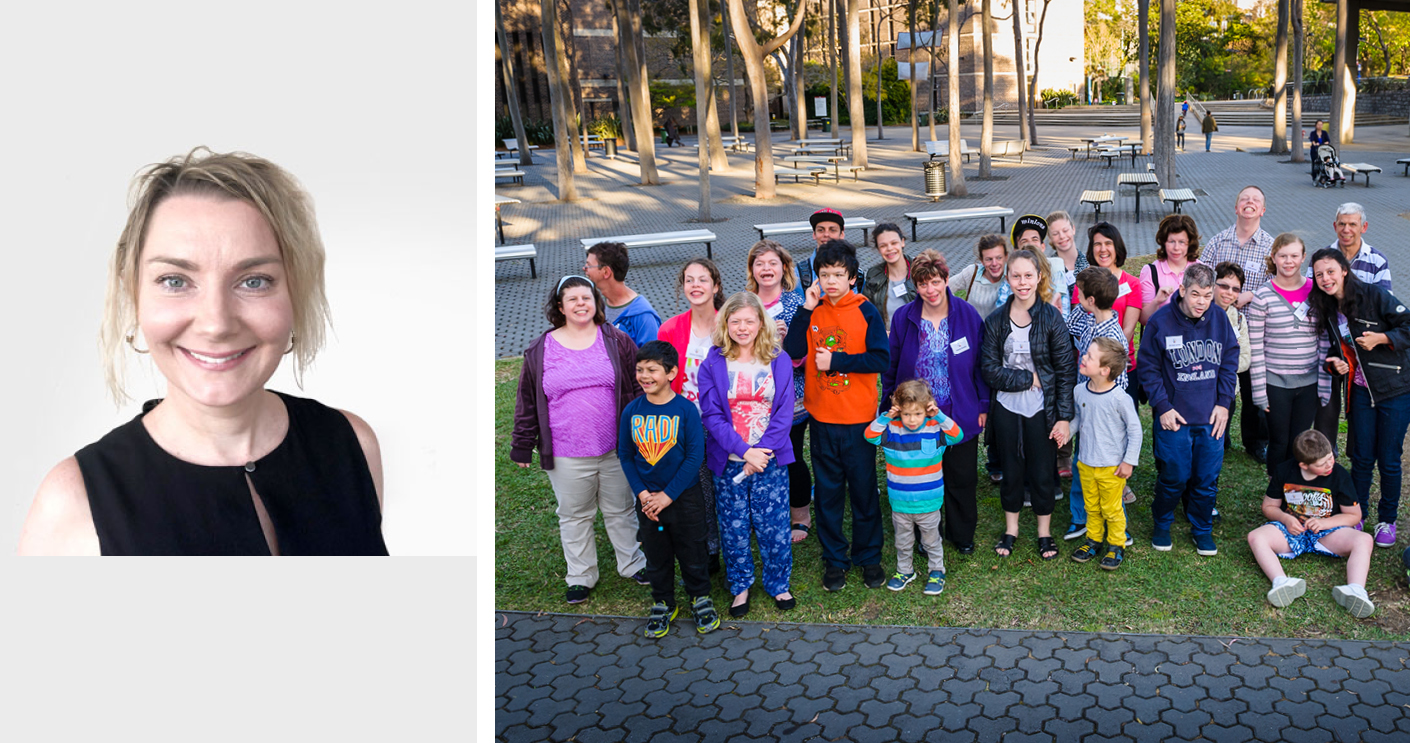Associate Professor Melanie Porter (left) and attendees of the Williams syndrome conference at Macquarie University.
As a Clinical Neuropsychologist and Associate Professor in the Department of Psychology, Melanie Porter’s research focus is on neurodevelopmental disorders, particularly in children.
Melanie’s unique expertise in Williams syndrome (or Williams-Beuren syndrome) – a rare genetic disorder which she has studied for over 20 years – saw her invited to contribute to Nature’s recent disease primer on the syndrome.
1. Something people usually ask you when they find out what you do for living
They ask what Williams syndrome is, as it’s a rare (but fascinating) condition. They also ask if working in the area child disability is stressful, to which I reply no – it’s a rewarding and such a positive area to work in. I love changing the lives of children with disabilities and their families and I feel I do this every day with my research and my clinical work.
2. Something you feel proud of
I’ve been invited to write a second paper for Nature on the international treatment guidelines for Williams-Beuren Syndrome, which will be published in December.
With the Nature Disease Primer, I successfully requested to interview an Australian family to show their personal experience and perspective. This is a first for the Disease Primer series.
3. A favourite photo from your camera roll
This little girl was a participant at our last Williams syndrome conference at Macquarie in 2014. She was contributing to a workshop on the good things and not so good things about having Williams syndrome. We can learn so much from these kids!

4. The first person you go to for advice
If it’s about research directions, always those with the condition and their families. I like to know their daily struggles, what they want more information on and what they think needs to change.
5. The coolest bit of equipment you use in your work
We use eye-tracking to look at how people with Williams syndrome process faces and social threat. Along with their social vulnerability and over-friendliness, they have a fixation on faces, especially the eye region. They also have trouble disengaging their attention from the eyes and faces.
Our brain imaging studies (which are not published yet) show this overfriendliness is related to the amygdala and frontal lobes in the brain. Interestingly, we found the same relationships between overfriendliness and amygdala and frontal brain volumes in Down syndrome.
6. What you need to do your best work
Grant money! I also like regular exercise.
7. A website or app you can’t live without
Facebook is a great way for families to connect with one another these days. There are Facebook pages for parents of children with various conditions, including one for Williams syndrome.
8. Something you’re trying to do differently in 2021
I’m applying for larger grants, which is hard when dealing with rare disorders. I’m looking at the broader implications of things I have learned in Williams syndrome, such as anxiety and social vulnerability (anxiety is six to ten times more common in Williams than in the general population).
With COVID-19, we are also doing a lot more online research.
9. When you’re at your happiest
When I’m with my nine year-old son, who also has special needs. I love making him smile and enjoying the simple things in life with him. Life gets too complex sometimes.
10. A Macquarie person you admire
Anyone who can successfully balance research, teaching and clinical work. Scientist/practitioners can offer so much, but it can be a constant juggle.
I also greatly admire working mums. Also hard to juggle!


 Back to homepage
Back to homepage
Comments
We encourage active and constructive debate through our comments section, but please remain respectful. Your first and last name will be published alongside your comment.
Comments will not be pre-moderated but any comments deemed to be offensive, obscene, intimidating, discriminatory or defamatory will be removed and further action may be taken where such conduct breaches University policy or standards. Please keep in mind that This Week is a public site and comments should not contain information that is confidential or commercial in confidence.